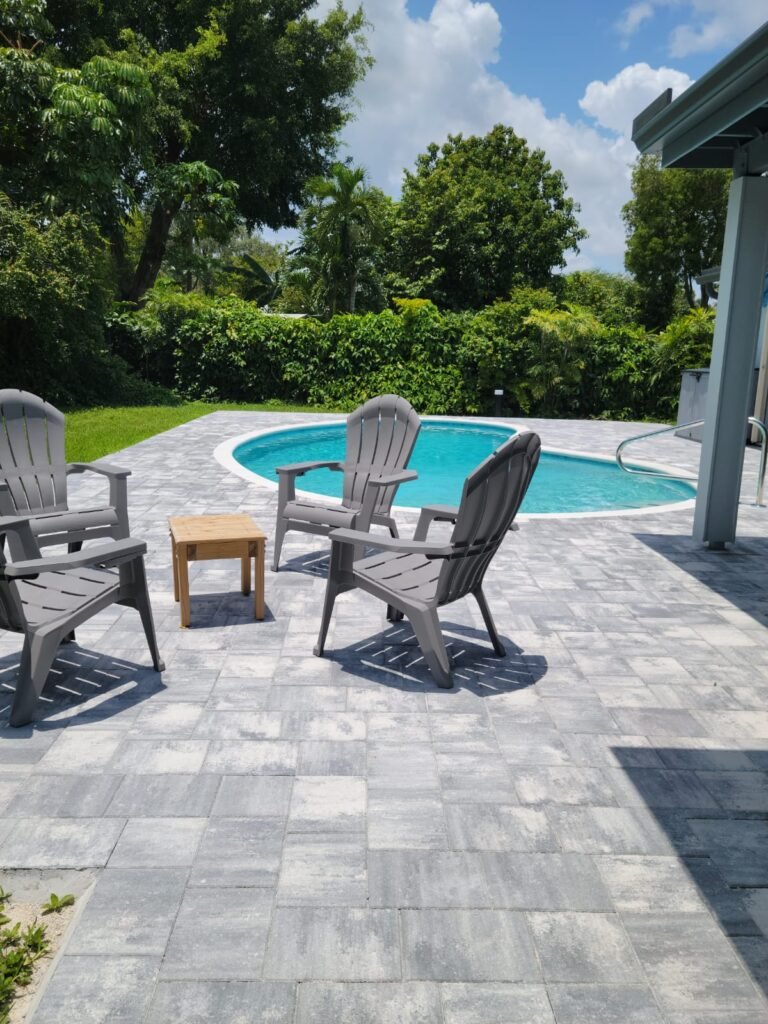
Dive into the transformative world of Pool Resurfacing. This essential process not only rejuvenates your pool’s aesthetics but also ensures its longevity and safety. In this article, we’ll guide you through the importance, materials, and maintenance of resurfaced pools. Get ready to breathe new life into your pool and make every swim an unforgettable experience
Table of Contents
TogglePool resurfacing, also known as pool refinishing, is a crucial aspect of pool maintenance. It involves the process of removing the old, damaged surface of a swimming pool and applying a new one. This is not just about making the pool look new and shiny; it’s about ensuring the longevity and safety of the pool structure.
Pool resurfacing is a process that can involve several materials, including plaster, fiberglass, pebble, and quartz. Each of these materials has its own set of benefits and drawbacks, and the choice often depends on the owner’s budget, aesthetic preferences, and maintenance capabilities.

Pool resurfacing is important for several reasons.
Firstly, it helps to maintain the structural integrity of the pool. Over time, the pool surface can become damaged due to various factors such as weather conditions, chemical imbalances, and general wear and tear. If left untreated, these damages can lead to more serious issues like leaks, which can be costly to repair.
Secondly, pool resurfacing can significantly enhance the appearance of your pool. A well-maintained pool can increase the value of your property and provide a more enjoyable swimming experience.
Lastly, pool resurfacing can also improve the safety of your pool. A damaged pool surface can lead to injuries due to sharp edges or rough surfaces. By resurfacing your pool, you can ensure a smooth and safe environment for all users.

One of the first signs that your pool may need resurfacing is fading or discoloration of the pool surface. Over time, the sun’s UV rays, pool chemicals, and general wear and tear can cause the pool’s surface to fade or discolor. This not only affects the pool’s appearance but can also indicate underlying issues that need attention.
Another clear sign that your pool needs resurfacing is the presence of cracks and chips in the pool’s plaster. These can occur due to fluctuations in temperature, ground movement, or simply the age of the pool. Small cracks might not seem like a big deal, but they can grow over time and lead to more serious problems like leaks.
If your pool’s surface feels rough or etched, it’s a sign that the plaster has worn down and it’s time for resurfacing. A rough surface can be uncomfortable for swimmers and can also cause swimwear to wear out faster. Moreover, an etched or pitted surface can harbor algae, making your pool harder to keep clean.
Water leaks are a serious sign that your pool needs resurfacing. If you notice that you’re needing to top up your pool water more frequently than usual, it could indicate a leak. Not only do leaks waste water, but they can also damage the surrounding area and lead to costly repairs if not addressed promptly.

The pool resurfacing process begins with draining the pool and preparing the surface. This involves chipping away the old surface material, cleaning the pool shell, and applying a bond coat to ensure the new surface material adheres properly.
Next, the new surface material is applied. This could be plaster, fiberglass, pebble, or quartz, depending on the owner’s choice. The material is spread evenly across the pool shell and smoothed out to ensure a flat and even surface.
Once the new surface material has been applied, it needs to cure for a certain period. This can vary depending on the material used and the weather conditions. After the curing process, the pool is filled with water, and the chemical balance is adjusted as needed.
Pool resurfacing offers numerous benefits. It improves the look of your pool, making it more inviting. It also makes the pool safer and more comfortable for swimmers. Additionally, a newly resurfaced pool is easier to clean and maintain, which can save you time and money in the long run.
In conclusion, pool resurfacing is an essential part of pool maintenance. By recognizing the signs that it’s time for resurfacing and understanding the process involved, you can ensure that your pool remains a safe and enjoyable place for everyone. Remember, a well-maintained pool is more than just a luxury – it’s an investment in your home and lifestyle.
Several factors can affect the pool resurfacing process. One of the main factors is the weather. Wet or cold weather can delay the curing process and may even affect the quality of the finish. Therefore, pool resurfacing is often done during warm, dry weather.
The condition of the existing pool shell can also affect the resurfacing process. If the pool shell is severely damaged, additional repairs may be needed before the new surface can be applied. This can increase the time and cost of the resurfacing project.
Lastly, the type of surface material chosen can also affect the process. Some materials, like quartz or pebble, may require more time to apply and cure than others, like plaster or fiberglass.
In conclusion, pool resurfacing is a vital part of pool maintenance that can enhance the appearance, safety, and longevity of your pool. Whether you choose plaster, fiberglass, pebble, or quartz for your resurfacing project, it’s important to understand the process and factors that can affect the outcome. For more information on pool resurfacing, check out our Tips for Pool Resurfacing.
When it comes to pool resurfacing, there are several options available, each with its own set of advantages and disadvantages. Let’s take a closer look at the four main types of pool resurfacing: fiberglass, plaster, pebble, and quartz.
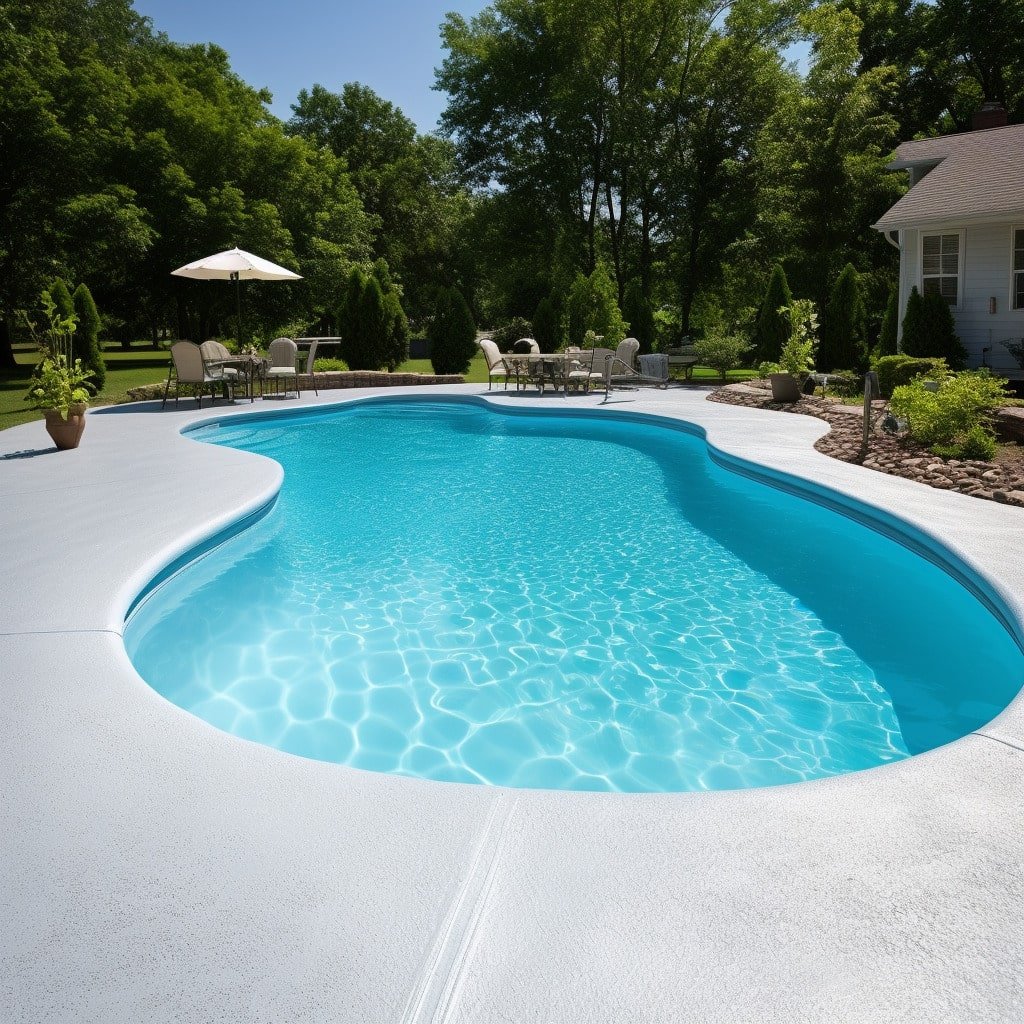
Fiberglass resurfacing is a popular choice due to its durability and smooth finish. It involves applying a layer of fiberglass mat coated with a polyester resin over the existing pool surface. This creates a non-porous surface that is resistant to algae and staining. However, fiberglass resurfacing may not be suitable for all pool types, especially those with complex shapes or designs.
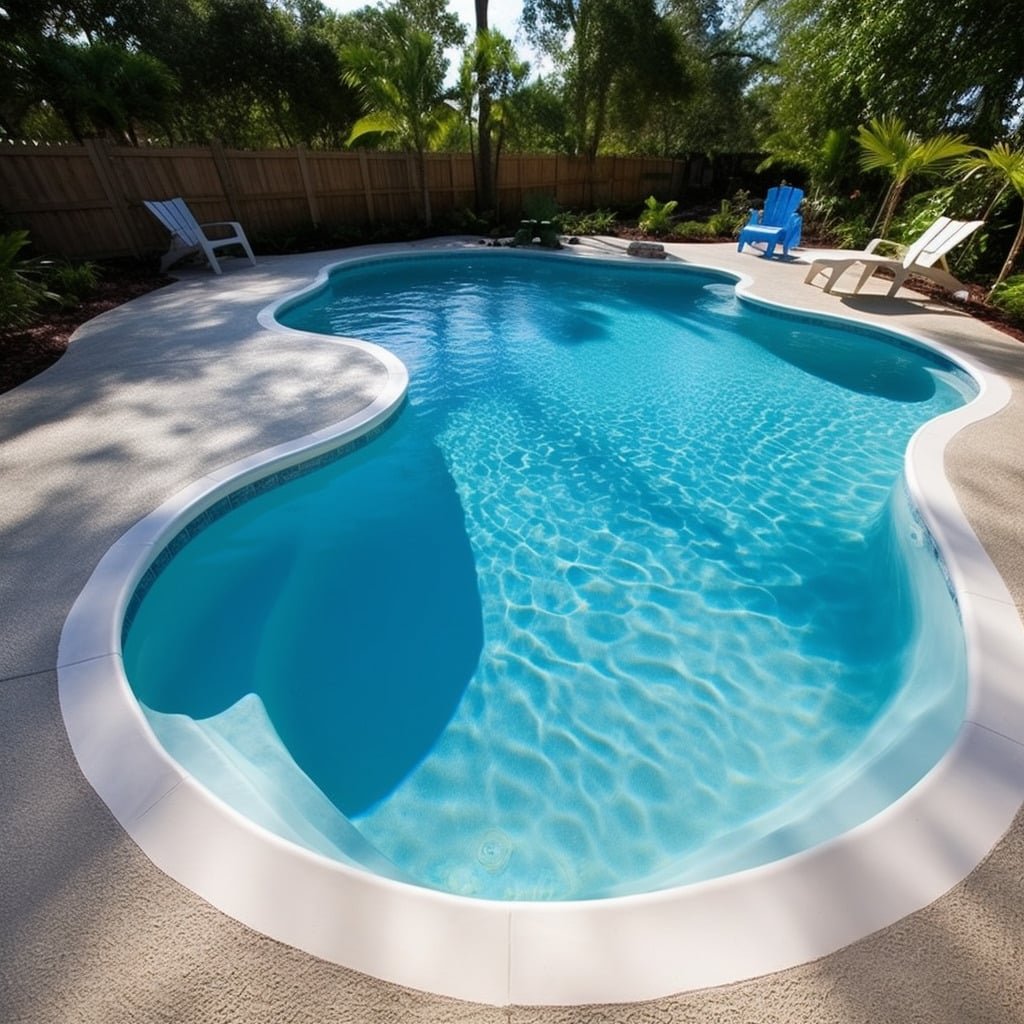
Plaster is the most traditional and common type of pool resurfacing. It is cost-effective and can last for many years if properly maintained. However, plaster surfaces can be prone to discoloration and staining over time, and they may require more frequent chemical balancing compared to other types of surfaces.
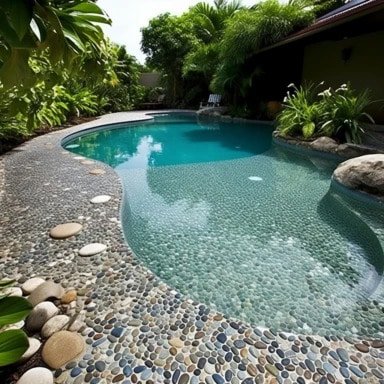
Pebble resurfacing involves applying a layer of small, smooth pebbles embedded in a strong adhesive. This type of surface is highly durable and offers a natural, aesthetically pleasing look. However, pebble surfaces can be rough underfoot, and the resurfacing process can be more labor-intensive and costly compared to other options
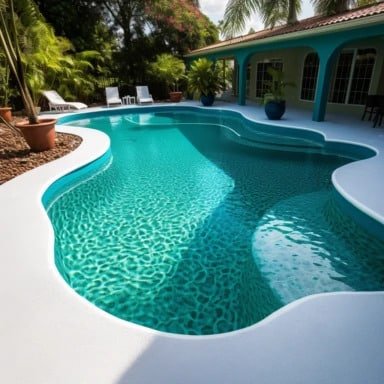
Quartz resurfacing is a premium option that combines the durability of pebble surfaces with the smoothness of plaster. Quartz surfaces are resistant to staining and discoloration, and they come in a wide range of colors. However, quartz resurfacing can be more expensive than other options.
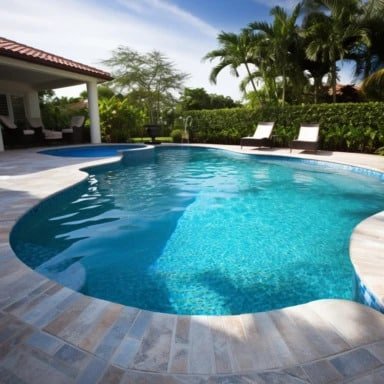
Tile resurfacing is the most luxurious option. It involves applying small tiles to the pool's surface, creating a stunning, customizable finish. Tiles are extremely durable and resistant to chemical imbalances. However, they're also the most expensive option and require a skilled installer.

White plaster resurfacing is a classic choice that provides a clean, bright finish. It's one of the most affordable options, but it's also the least durable and can start to show signs of wear and tear within a few years.
When it comes to choosing the right pool resurfacing material, there are several factors to consider.
Firstly, you’ll need to consider the usage of your pool. If your pool is used frequently or by young children, a smooth, durable material like fiberglass or quartz might be the best choice. If your pool is more for aesthetic purposes, a high-end finish like tile or exposed aggregate might be more suitable.
Your budget will also play a big role in your decision. Materials like plaster and white plaster are more affordable, but they may not last as long and can require more maintenance. On the other hand, materials like tile and exposed aggregate are more expensive upfront but can last longer and require less maintenance.
The longevity and durability of the material are also important considerations. If you want a long-lasting finish that can withstand the elements, materials like quartz, pebble, and tile are excellent choices.
Finally, consider the aesthetic appeal and customization options of the material. If you want a unique, personalized finish, materials like tile and exposed aggregate offer a wide range of colors and textures to choose from.
The cost of pool resurfacing can vary greatly depending on several factors:
Type of resurfacing material: As mentioned above, the cost can vary significantly depending on whether you choose fiberglass, plaster, pebble, or quartz for your resurfacing project.
Size and depth of the pool: Larger and deeper pools will require more resurfacing material, which can increase the cost.
Condition of the existing pool surface: If the existing surface is severely damaged and requires extensive repairs before resurfacing, this can also increase the cost.
Local labor rates: The cost of labor can vary depending on your location and the time of year.
On average, pool resurfacing can cost anywhere from $1,000 to $30,000, with most homeowners spending around $6,500. However, this is just a rough estimate, and the actual cost can vary depending on the factors mentioned above. For a more accurate estimate, it’s best to get quotes from several local pool resurfacing professionals. You can also check out this Pool Resurfacing Process guide for more detailed information.
In conclusion, pool resurfacing is a significant investment that can greatly enhance the appearance, durability, and value of your pool. By understanding the different types of resurfacing options and the factors that can affect the cost, you can make an informed decision that best suits your needs and budget.

If you’re considering pool resurfacing, it’s important to understand the factors that can affect the cost of the project. Here are some key factors to consider.
The size and shape of the pool are major factors that can affect the cost of pool resurfacing. Larger pools or pools with complex shapes will require more materials and labor, resulting in a higher cost.
The chosen resurfacing material can also significantly affect the cost. Materials like plaster and white plaster are more affordable, but may not last as long. On the other hand, materials like tile and exposed aggregate are more expensive upfront but can last longer and require less maintenance.
Any additional repairs and upgrades that need to be done during the resurfacing process can also add to the cost. This could include repairing cracks or leaks, replacing pool equipment, or adding new features like lighting or a heater.
In conclusion, pool resurfacing is a significant investment, but it’s an essential part of maintaining a safe and attractive pool. By understanding the factors that can affect the cost and the advantages of hiring professional services, you can make an informed decision that best suits your needs and budget.
Knowing when your pool needs resurfacing is crucial to maintaining its structural integrity and aesthetic appeal. Here are some signs that your pool may need resurfacing:
Stains and discoloration: Over time, chemical imbalances, algae growth, and mineral deposits can cause stains and discoloration on your pool surface. If these stains are widespread or cannot be removed with regular cleaning, it may be time to consider resurfacing.
Rough texture: If the surface of your pool has become rough or uncomfortable to touch, this could be a sign of wear and tear that requires resurfacing.
Cracks or damage: Small cracks or damage can often be repaired without resurfacing. However, if your pool has large cracks or multiple areas of damage, resurfacing may be necessary.
Frequent need for repairs: If you find yourself needing to repair your pool frequently, this could be a sign that the surface material is nearing the end of its lifespan.
If you’re unsure whether your pool needs resurfacing, consider consulting with a professional pool service like Poolside Renos, who can provide expert advice and services.

Once you’ve invested in pool resurfacing, it’s important to maintain your pool properly to prolong the life of the new surface and keep your pool looking its best. Here are some key tips for maintaining a resurfaced pool.
Maintaining proper pool water chemistry is crucial for preserving the condition of your pool’s surface. This involves regularly testing the water and adjusting the levels of chemicals like chlorine, pH, and alkalinity as needed. Improper water chemistry can lead to issues like discoloration, etching, and scaling on the pool’s surface.
Regular cleaning and maintenance are also essential for keeping your pool in top shape. This includes skimming the pool to remove debris, brushing the pool’s surface to prevent algae buildup, and vacuuming the pool to remove any dirt or sediment. It’s also important to clean the pool’s filter regularly to ensure it’s working efficiently.
If you notice any minor issues with your pool, such as small cracks or discoloration, it’s important to address them promptly. Minor issues can quickly turn into major problems if left untreated, leading to more costly repairs down the line.
Finally, consider scheduling periodic inspections with a pool professional. They can spot potential issues that you might miss and provide advice on how to address them. Regular inspections can help ensure that your pool remains in good condition for many years to come.
Once your pool has been resurfaced, you might want to consider enhancing the surrounding area to create a truly stunning outdoor space. Here are some ideas to inspire you.
Landscaping and hardscaping can greatly enhance the look of your pool area. This could involve planting colorful flowers or lush greenery around the pool, installing a patio or deck for lounging and dining, or adding a pathway leading to the pool. The options are endless and can be tailored to suit your personal style and the overall look of your home.
Installing pool accessories and features can also add to the enjoyment of your pool. This could include a slide or diving board for fun, a pool heater for year-round swimming, or a pool cover to keep your pool clean and reduce evaporation.
Finally, consider pool lighting options to create a beautiful ambiance for evening swims or poolside gatherings. This could involve installing underwater lights for a magical swimming experience, landscape lighting to highlight your garden, or string lights for a cozy and inviting atmosphere.
When it comes to pool resurfacing, hiring professional services offers several advantages. Here are some reasons why you might want to consider professional services for your pool resurfacing project.
One of the main advantages of hiring professional services is the expertise and experience they bring to the table. Companies like Pool Renos have years of experience in pool resurfacing and have dealt with a wide range of pool types and issues. This means they can provide expert advice and high-quality workmanship, ensuring your pool is resurfaced to the highest standards.
Hiring Pool Renos can also ensure timely completion and minimal disruption. Pool resurfacing can be a time-consuming process, especially if you’re not familiar with the steps involved. Pool Renos can complete the job quickly and efficiently, minimizing the time your pool is out of action.
Finally, professional pool resurfacing services often come with a warranty and aftercare services. This means that if any issues arise after the resurfacing, you can have them addressed without additional cost. This can provide peace of mind and ensure that your pool remains in top condition for many years to come.
If you’re considering professional pool resurfacing services, Pool Renos is a great option. With their extensive experience and dedication to customer satisfaction, they ensure top-notch results that stand the test of time.
The cost to resurface around a pool can vary greatly depending on the size of the pool, the type of resurfacing material used, and local labor rates. On average, pool resurfacing can cost anywhere from $1,000 to $30,000, with most homeowners spending around $6,500.
The best type of pool resurfacing depends on your budget, aesthetic preferences, and maintenance capabilities. Fiberglass, plaster, pebble, and quartz are all popular options, each with their own set of advantages and disadvantages.
When a pool is resurfaced, the old, damaged surface is removed, and a new one is applied. This involves draining the pool, preparing the surface, applying the new surface material, and allowing it to cure before refilling the pool.
Replastering involves applying a new layer of plaster over the existing plaster surface. Resurfacing, on the other hand, can involve a variety of materials, including plaster, fiberglass, pebble, and quartz, and often involves removing the old surface before applying the new one.
Do you need access to a variety of Pool Resurfacing services? In addition to other services, Poolside Renos – A Discount Pool & Patio Company provides pool deck resurfacing, pool plaster resurfacing, pool tile and coping repair, pool acid cleaning, and more. Our in-depth expertise in pool resurfacing allows us to guarantee that your pool will look great and last for many years. We take pleasure in what we do and work hard to give you the finest service possible. We provide pool resurfacing services for pools in both commercial and residential buildings. Contact us now to learn more about our pool resurfacing benefits.
Pool resurfacing is a vital part of pool maintenance that can enhance the appearance, safety, and longevity of your pool. Whether you choose plaster, fiberglass, pebble, or quartz for your resurfacing project, it’s important to understand the process, the costs involved, and the signs that your pool may need resurfacing.
Pool resurfacing is a significant investment, but it’s one that can pay off in the long run by preventing more costly repairs and extending the life of your pool. As always, it’s best to consult with a pool professional to determine the best resurfacing option for your specific needs and budget. Companies like Poolside Renos offer a range of services, including pool remodeling, water features, pool finishes, and pool equipment, to help you create or update your own little paradise.
Remember, a well-maintained pool is not only a joy to use but also a valuable asset to your property. For more information on pool resurfacing, check out these resources on Cost of Pool Resurfacing and Tips for Pool Resurfacing.
